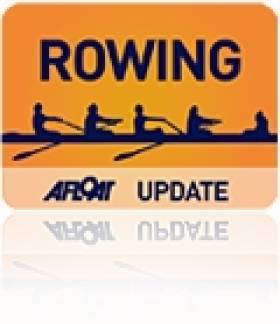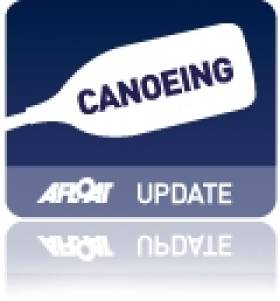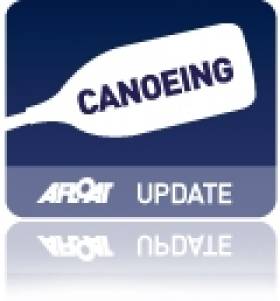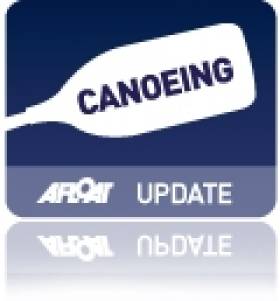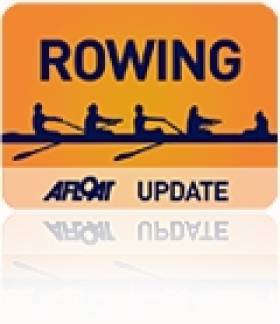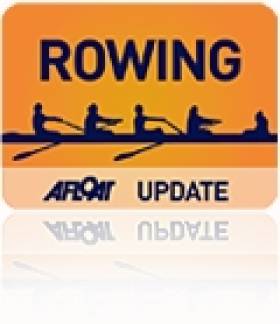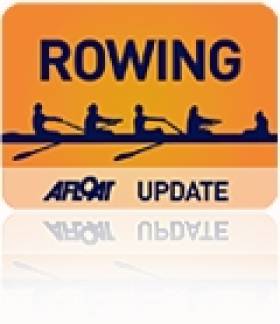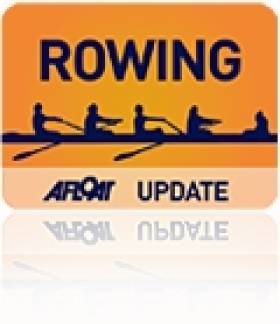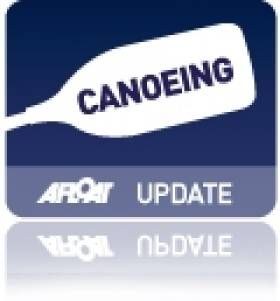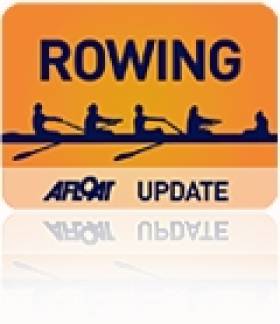Displaying items by tag: Ireland,
Ireland Crews Begin Programme at World Rowing Championships
# ROWING: Ireland began their campaign in the World Senior and Junior Rowing Championships today at Plovdiv in Bulgaria. The senior programme is for non-Olympic events. The Ireland team has been boosted by the inclusion of Claire Lambe in the lightweight single scull. The first Ireland crew in action was the junior women’s quadruple, which finished fifth and must compete in a repechage tomorrow. The were not helped by catching a crab (missing a stroke) in the middle of the race.
World Rowing Championships, Plovdiv, Bulgaria – Day One (Irish interest)
Women
Junior Quadruple Scull – Heat Two (First Two to Semi-Final A/B, rest to repechage): 1 Romania 6:36.54, 2 New Zealand 6:39.41; 5 Ireland 7:00.39.
# CANOEING: Ireland took a creditable ninth place at the Olympic Games today when Andrzej Jezierski dominated the B Final of the C1 200 metres in the Canoe Sprint competition at Eton Dorney.
Jezierski, who had a poor start in his semi-final and missed out a place in the A Final, nailed it this time and led as he came into the closing stages. Vadim Menkov of Uzbekhistan came closest to catching the Cork-based competitor, but Jezierski won by .127 of a second.
Olympic Games – Canoe Sprint, Eton Dorney – C1 200m, B Final (places 9 to 16): 1 Ireland (A Jezierski) 44.041 seconds, 2 Uzbekhistan 44.168, 3 Hungary 44.466.
# CANOEING: A poor start cost Andrzej Jezierski dearly it the Olympic Canoe Sprint semi-finals this morning. A very tough draw in the C1 200 metres saw the Ireland competitor needing to finish in the first two of a top-class field to be sure of a final place, though the two fastest third-place losers of the three semis would also qualify. However, Jezierski struggled from the start and even his customary better second half could only secure fourth. It was the fastest of the three semi-finals. Jezierski is now set for the B Final.
The top two places in the semi-final were taken by Ivan Shtyl of Russia and Alfonso Benavidez Lopes de Ayala of Spain.
Olympic Games
Canoe Sprint – Eton Dorney – C1 200m – Semi-Final (First Two to Semi-Finals): 1 Russia (I Shtyl) 40.346, 2 Spain (A Benavidez Lopes de Ayala) 40.619; 4 Ireland (A Jezierski) 42.012.
# CANOEING: Ireland had a terrific start in the Olympic Canoe Sprint events at Eton Dorney this morning. Andrzej Jezierski was not happy with his start in the C1 200 metres but covered the second 100 metres very well to to finish second and qualify comfortably for the semi-finals.
Mathieu Goubel of France won the heat, but the big surprise was that Valentin Demyanenko, the reigning world champion, did not qualify. The man who represents Azerbaijan finished seventh and last.
Olympic Games
Canoe Sprint – Eton Dorney – C1 200m – Heat One (Six to Semi-Finals): 1 France (M Goubel) 41.248, 2 Ireland (A Jezierski) +0.156, 3 Japan (N Sakamoto) +0.280, 4 Canada (J McCoombs) 0.494, 5 Brazil (R Oliveira) +0.968, 6 Australia (S Marczak) +1.597; 7 Azerbaijan (V Demyanenko) +2.946.
Just Two Senior Ireland Crews For World Rowing Championships
# ROWING: Ireland will field just two senior crews at next week’s World Senior and Junior Rowing Championships in Plovdiv in Bulgaria. The lightweight men’s pair of Mark O’Donovan and Anthony English will be joined by lightweight single sculler Niall Kenny. The senior events are for crews in non-Olympic events.
The four junior crews representing Ireland will be a women’s quadruple scull, the men’s pair of Chris Black and Joel Cassells and single scullers Paul O’Donovan and Kate O’Brien.
Competition at the Championships begins on Wednesday and runs through to Sunday.
Rowing Ireland Looks for New HPD as McElroy Steps Down
# ROWING: Martin McElroy, the Ireland High Performance Director, will not be seeking renewal of his contract when it finishes at the end of next month. The Galway man took up work as HPD in 2009, stressing that his priority was to build a sustainable system, and one which would outlast him.
Forming a strong under-23 group was a priority, and there were successes here, including a silver medal for the men’s lightweight quadruple at the World Under-23 Championships in 2010. Ten athletes represented Ireland at this year’s World Under-23 Championships.
A team of coaches was also formed and the National Rowing Centre became the base for an ambitious group of athletes.
However, just one senior athlete competed for Ireland at the Olympic Games - Sanita Puspure finished 13th in the single sculls. The strong hopes for the lightweight double scull of Siobhan McCrohan and Claire Lambe ended controversially when McCrohan was cut because of difficulties making the weight.
Rowing Ireland has advertised for a new HPD, with entries closing on September 14th.
Puspure Ends Well at Olympic Rowing Regatta With Win in C Final
# ROWING: Sanita Puspure won the C Final of the women’s single sculls with great ease at the Olympic Games regatta at Eton Dorney today, placing her 13th overall. Micheen Thornycroft of Zimbabwe showed well early on, but Puspure took over in the second quarter of the race and had a clear one-length lead by 1250 metres. She then pushed on to win by almost eight seconds.
The A Final winner was Mirka Knapkova of the Czech Republic. Silver and bronze went to Fie Udby Erichsen of the Denmark and Kim Crow of Australia.
In an interesting twist, the Olympic Qualification Regatta in Lucerne had been a good indicator of form at Eton Dorney. Crow had won there, while Erichsen had finished second. Genevra Stone of the United States, who was third in Lucerne, won the Olympic B Final (seventh overall), while Puspure was fourth in Lucerne. Crow had a great Olympics, taking silver in the double sculls.
Olympic Games Regatta, Eton Dorney (Irish interest)
Women’s Single Sculls – C Final (places 13 to 18): 1 Ireland (S Puspure) 7:59.77, 2 Zimbabwe (M Thornycroft) 8:07.52, 3 Cuba (Y Cobas Garcia) 8:14.59, 4 El Salvador 8:19.75, 5 Thailand 8:34.11, 6 Brazil did not start. A Final: 1 Czech Republic (M Knapkova) 7:54.37, 2 Denmark (FU Erichsen) 7:57.72, 3 Australia (K Crow) 7:58.04.
# ROWING: Sanita Puspure had a great start and battled hard in the toughest quarter-final of the single scull at the Olympic Regatta. However, a fourth-place finish left her one place outside the mix for the A/B semi-finals.
Puspure actually led off the start. Mirka Knapkova, the reigning World Champion, had taken over by 500 metres, but Puspure was tucked into third, with Frida Svensson (the World Champion of 2010) in second. Genevra Stone could only manage fifth at this stage, but the American was outstanding through the rest of the race: she pushed Puspure into fourth by halfway, and by the finish she had taken over second from Svensson. The Swede held off Puspure’s late efforts to take third.
Interestingly, the Olympic Qualification Regatta in May – the last chance to get to the Games – provided three A/B Semi-Finalists. Kim Crow of Australia and Fie Udby Erichsen of Denmark actually won their quarter-finals, and Stone finished second in hers with Puspure finishing in a time which would have put her in the top three in each of the other quarter-finals.
The Ireland athlete is now set to compete in the C/D Semi-Finals on Thursday.
Olympic Games – Rowing – Women’s Single Sculls Quarter-Final Two (Three to A/B Semi-Finals; rest to C/D Semi-Finals): 1 Czech Republic (M Knapkova) 7:35.35, 2 United States (G Stone) 7:39.67, 3 Sweden (F Svensson) 7:40.64; 4 Ireland (S Puspure) 7:44.19, 5 Cuba (Y Cobas Garcia) 7:56.89, 6 El Salvador (C Vargas Palomo) 8:07.67.
# CANOEING: A very good second run in the heats, when she was under real pressure to perform, gave Ireland’s Hannah Craig a place in the semi-finals of the Olympic Games today. Eoin Rheinisch had qualified in the canoe slalom in the men's K1 on Sunday.
The course at Lee Valley proved extremely testing for the competitors in the women’s K1 canoe slalom. The top 15 of 21 qualified, and Craig clocked 117.07 seconds for her first run, which placed her 14th for the first run. This included eight seconds in penalties. The time put her into second place at this stage behind Luuka Jones of New Zealand who clocked 109.23. However, the top competitors then pushed through, with Maialen Chorraut of Spain setting an outstanding time of 98.75 seconds. But some of the top canoeists in the world, including Jessica Fox of Australia and Corinna Kuhnle of Austria did poorly on the first run and lay behind Craig, with every chance they would push Craig out with their second runs: the Irishwoman knew she had to improve to be sure of making that top 15.
Her second run looked better from the start. She moved sweetly all the way to the really difficult gate 12, on which she lost some time, but she found her way again and only a clip on gate 19, bringing her a two-second penalty, tainted a fine round of 108.99 seconds.
Fox and Kuhnle did indeed set excellent times in their second runs, ensuring that even the better second run only secured 14th place for Craig. Jones took the 15th spot.
Olympic Games – Canoe Slalom – Women’s K1 Heats (First 15 qualify for semi-final): 1 Spain (M Chorraut) 98.75 (1st run); 14 H Craig 108.99 (2nd run).
# ROWING: Ireland’s Sanita Puspure faces a tough task tomorrow (Tuesday) if she is to attain her aim of qualifying for the Olympic semi-finals in the single sculls. In an ironic twist, she will most probably have to finish ahead of Genevra (Gevvie) Stone of the United States in their quarter-final to qualify. Three go through, and Mirka Knapkova of the Czech Republic and Frida Svensson of Sweden will be hot favourites to take the first two places, most likely leaving Stone and Puspure to fight it out for the third qualification place. In the Olympic Qualification regatta in May, Puspure targeted finishing ahead of Stone, but saw the American produce a fine performance to finish third. Puspure then showed great determination to take out Iva Obradovic of Serbia to take the fourth qualification place.
At Dorney Lake today, the New Zealand four, which features Irishman Sean O’Neill, finished fourth in their heat and will need to compete in the repechage to go further. The dominant Australian crew won the heat and set a stunning time of five minutes 47.06 seconds. This was a new Olympic Best time. Britain were also dominant in their race, and the United States won the third heat.
Olympic Games – Rowing, Dorney Lake, Day Three (Irish Interest)
Men’s Four – Heats (First Three Directly to A/B Semi-Finals; rest to Repechage) – Heat One: 1 Australia 5:47.06, 2 Germany 5:49.84, 3 Canada 5:50.78; 4 New Zealand 5:51.84, 5 Serbia 5:53.35.


























